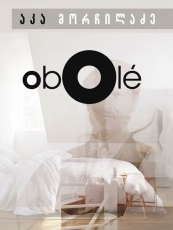OBOLE
Irakli, a playwright, is living an ordinary urban life in Tbilisi when one day he receives a phone call from his small home town near the wild Swanetian mountains: his old house there is in danger of collapsing and the roof must be repaired as a matter of urgency. It is a long time since he has visited the region where as a child he spent the summers with his grandfather, the pharmacist, and read the dense handwriting in the notebooks of his great-grandfather, Timote. Timote was the self-appointed chronicler of the town and in particular of the towering Muri fortress opposite Irakli’s house whose lords had been his ancestors.
During the few days that Irakli, the city-dweller, spends in his grandfather’s house he is overwhelmed by memories, by the chequered history and the stories of the place. Those who have remained there do their best to draw him into the magic of the past. During his inspection of the damaged roof he discovers in the attic the long-forgotten Obolé – an old, beautifully worked flintlock gun that had been a gift from the king of Imereti to the then lord of Muri. No one knows when the gun was last fired. Irakli’s uncle had christened it Obolé (orphan); he treasured it and looked after it. In peacetime and when there were no children in the house it hung on the carpet-covered wall of the parlour; once, without firing a shot, it had even saved the life of its earlier owner. Although firearms are more usually associated with masculinity, to Irakli Obolé is like a beautiful woman. Obolé comes from a time when weapons were like women, when dignity and honour and stories of such things still mattered. These stories soon have such a hold over Irakli that the picturesque past merges imperceptibly with the present. But when the leading part is played by a gun, one cannot but wonder when the shot will be fired.
EXTRACT
Translated into German by Natia Mikeladze-Bakhsoliani
Boy, that was really something.
I won´t forget that if l live to be a hundred.
- Henry, the stage is leavin´!
- All right, all right!
Wait till Flora hears about this.
Y´know, she won´t believe one word of it.
- Henry! The stage! Come on!
The Magnificent Seven
Weißt du, ich hab kein Handy, ich komm damit nicht zurecht. Troubles are much less, wenn man in Tbilissi kein Handy hat. So ist die Stadt. Als Kind war ich mal in Jugoslawien. Das hat sich so ergeben: Tourismus, Dubrovnik. Und da sagt ein Taxifahrer zu mir und meiner Mutter auf Russisch: Jugoslawien ist ein Klein-Amerika. Sagt das ganz unbefangen und fröhlich.
Wenn in Amerika Tag ist, ist hier Nacht. Das wissen wir schon lange.
Also, die SMS erreichte uns, wie sonst auch, auf dem Handy meiner Frau. Wir haben sie am Morgen vorgefunden, und schon wusste ich nicht mehr, was ich tun sollte.
Mein Bruder lebt in Santa Barbara. Da gibt es nichts zu lachen. Er lebt wirklich in Santa Barbara. Könnt ihr euch noch an die Fernsehserie „Santa Barbara“ erinnern, die nie enden wollte? Meine Mutter hat sie sich angeschaut. Sie fing an, als Sacharow freigelassen wurde, dann wurde Dschaba Iosseliani verhaftet, das zweite Mal, und sie guckte immer noch „Santa Barbara“. Ja, und in diesem Santa Barbara lebt nun mein Bruder. Eigentlich seltsam. Ich habe kein musikalisches Gehör, mein Bruder dafür das absolute. Er hilft Hollywoods namhaften Komponisten in Sachen Filmmusik. Es kommt vor, dass er sich die Melodie ausdenkt, aber im Abspann dann ein anderer Name steht. So scheint die Regel zu sein. Man muss auf den Karrieredurchbruch warten. Einen sogenannten Breakthrough. Überhaupt ist mein Bruder ein ziemlich cooler Typ, er hat noch nicht mal eine Glatze. Er hat sogar in den Clubs von New Orleans gespielt... (See PDF)
In case of using the information, please, indicate the source.
